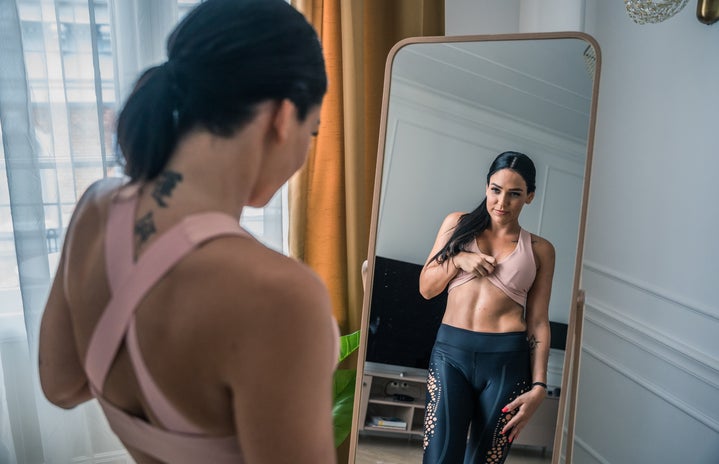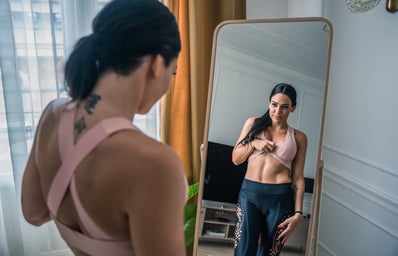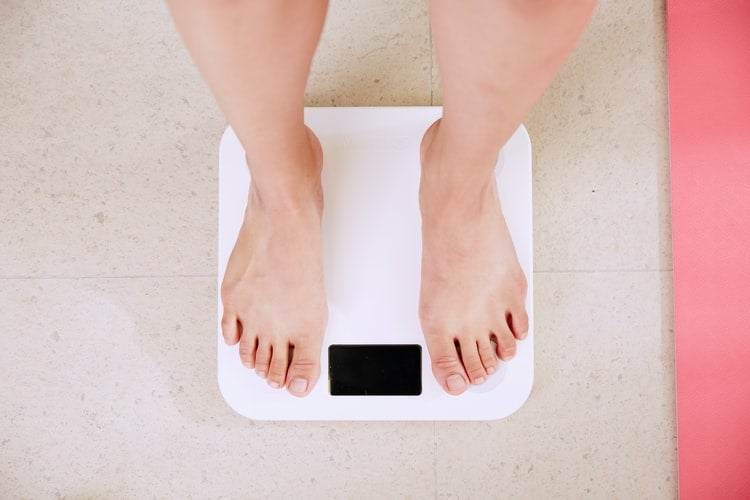Trigger warning: this article contains mentions of body image
“Strive to look toned, but don’t get too bulky! Don’t eat too much, but make sure you meet your protein goal! Have some discipline, but also eat intuitively!” These are all phrases I’ve heard and thoughts that have consumed my mind. In a society of ever-changing beauty standards, how can you possibly be content with your body?
Prior to high school, I played soccer, took dance classes, and went skiing during the winters. In high school, I tried track and field, cross country, and the swim team. I had always been active, but had never been the top performer in any sport that I participated in. I’d also never loved my body, but up until high school I never really took actions to change it.
Right before COVID-19 forced everyone to stay home at the end of my senior year of high school, my dad built a home gym in the basement of our house. My brother had wanted me to try weightlifting for a while, but I’d always been intimidated by the idea and was content to stick to the sports I was used to. But once the pandemic hit, I had nothing but time to focus on my fitness, and nothing but excuses for why I couldn’t try weightlifting.
My brother taught me proper form for different exercises and tips for how to split up a week of workouts. I very quickly began to enjoy the process of getting stronger, and I took it upon myself to seek out fitness influencers online to get even more tips and motivation. When the pandemic prevented me from attending college during the fall of my freshman year, I continued to lift heavier weights and I became the strongest and most confident that I had ever been up until that point.
Finally in the spring semester of my freshman year, I was able to attend UMass in person. This changed my relationship with working out once again because the recreation center was open but only at a limited capacity. When I couldn’t make it there, I would do workouts in my dorm room with lighter weights or get outside for a run. This wasn’t ideal, but it also wasn’t a huge concern to me because I was so excited to be taking on a new stage of my life. Simultaneously, I began to eat smaller portions at school than I had at home. This wasn’t fully intentional, but the dining hall was only open for a “grab and go” style, so it wasn’t a main part of the college experience.
Once I came home from that semester and realized I had lost some weight, I wanted to continue that pattern. It was summertime and I was determined to combine the weight lifting in my basement with the smaller portions of food that I had become accustomed to, and look the best that I ever had. Sure enough, this was successful and I continued to shed some pounds.
During my sophomore year, I continued to cut portion sizes down, continued to lift weights, and tried to walk on campus as much as possible. But at a certain point, my mind was still striving to lose weight even though my body was quite lean. My family would tell me that I didn’t need to lose any more weight, but I still wanted to be smaller.
If I was being honest with myself, I was very exhausted nearly all the time. My personality was dull and irritable, I was cold from a lack of blood circulation, my hair was thinning, and I was having hormonal issues. It took me until the summer after my sophomore year to finally seek help in the form of therapy. I knew that I had taken fitness and nutrition to an unhealthy level and that I couldn’t go on pushing myself to that extent any longer.
As I began to honor my food cravings and try to accept bigger food portions, I often felt out of control around food. I had an “all or nothing” mindset and would overindulge in foods that I felt guilty for eating, which only left me feeling sick and shameful. Throughout the process of healing, I gained back all of the weight that I had lost. This took a huge mental toll on me because I had to let go of the smaller body that I had worked so hard to achieve. It took nearly a year of therapy, as well as a lot of trial and error, to feel that I had gotten back to a stable point in my relationship with food.
I would be lying if I said that I now feel perfectly comfortable in my skin and around diet culture. I still have those intrusive thoughts that I need to lose weight, that healthy eating is black and white, and that physical appearances hold so much value. But I think the most important thing that I have learned through my healing journey is to be kinder to myself and focus my energy towards meeting my emotional needs. Everyone’s story is different, and each story will always be evolving.
Can’t get enough of HC UMass Amherst? Be sure to follow us on Instagram, listen to us on Spotify, like us on Facebook, and read our latest Tweets!





